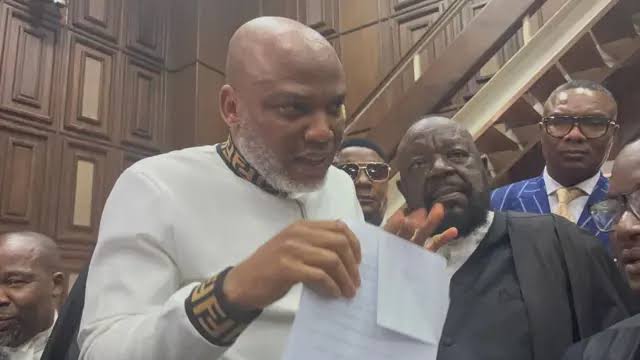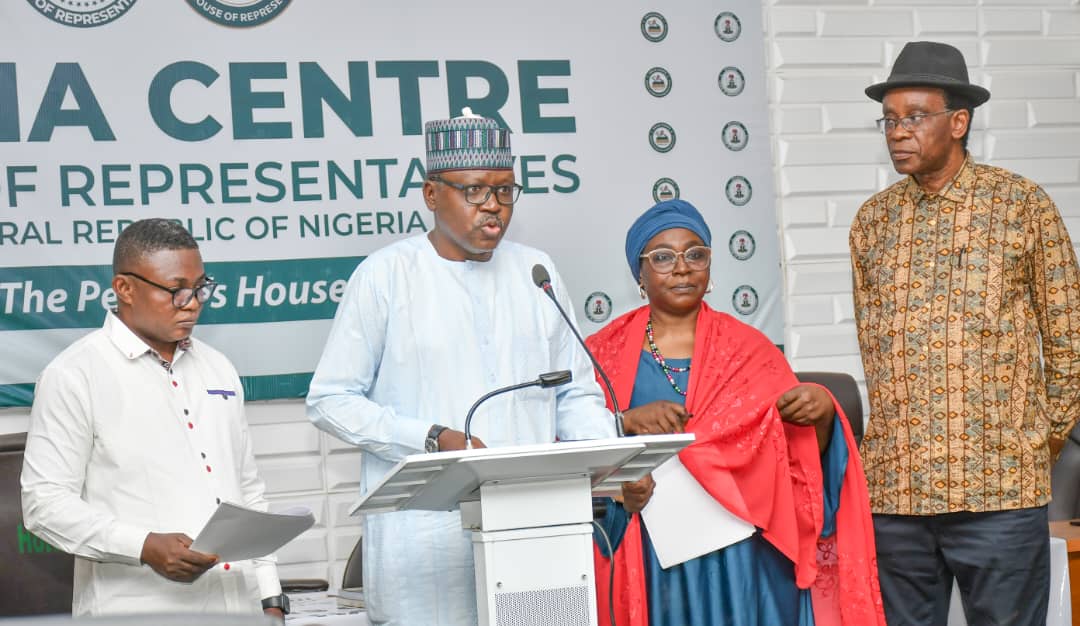News
High Court Chief Judge sends Nnamdi Kanu’s case file back to Nyako

By Francesca Hangeior
The Chief Judge of the Federal High Court (FHC), Justice John Tsoho, has reassigned the Federal Government’s case against Nnamdi Kanu, leader of the proscribed Indigenous People of Biafra (IPOB) back to Justice Binta Nyako.
It could be recalled that Justice Nyako had, on Sept. 24, recused herself from the trial of the detained Kanu, following oral applications by the IPOB leader and his lawyer, Aloy Ejimakor.
However, a reliable source at the FHC informed NAN that the CJ had reverted the file to Justice Nyako.
It was gathered that the decision of Justice Tsoho was premises on a condition that Kanu’s request must be formally presented before the court through a motion on notice, stating reasons he did not want to stand trial before Nyako.
“It is expected that the defendant will now duly serve the Federal Government, through the Office of the Attorney-General of the Federation and Minister of Justice, a copy of the motion for the prosecution’s response.”
“The parties will address the court and a decision will be taken by the judge.”
Justice Ahmed Mohammed and Justice Tsoho (before becoming the CJ) had presided over Kanu’s trial before it was assigned to Justice Nyako, following the defendant’s rejection of the two judges.
However, on the last adjourned date, shortly after the FG’s lawyer, Adegboyega Awomolo, SAN, informed the court that the matter was slated for continuation of trial, Ejimakor asked the court to adjourn the trial due to two pending appeals challenging the court’s jurisdiction.
Awomolo argued that a criminal trial cannot be stalled because of a pending appeal and that the defence should file for a stay of proceedings at the appellate court.
Justice Nyako then stated that the parties should not delay the matter, having ruled that the court would not attend to any applications until the end of the trial.
Ejimakor insisted it was inappropriate to continue with the trial when he had not adequately prepared his client for the defence.
He asserted that all court orders directing that his client should be allowed to prepare for his defence had allegedly been disobeyed.
While Ejimakor was addressing the court, Kanu stood up from his seat in the dock and ordered him (Ejimakor) to sit down in anger.
“Sit down! I say you should sit down!” Kanu screamed from the dock.
He insisted that the Supreme Court had ruled that his fundamental rights should not be violated by the detaining authority, especially regarding access to his lawyers.
Turning to Justice Nyako, the IPOB leader said: “My lord, I have no confidence in this court any more and I ask you to recuse yourself because you did not abide by the decision of the Supreme Court.
“I can understand it if the DSS refuse to obey a court order, but for this court to refuse to obey an order of the Supreme Court is regrettable.
“I am asking you to recuse yourself from this case,” Kanu stated.
But Awomolo countered the argument on the Supreme Court’s judgment delivered in 2023.
He argued that the apex court mandated the lower court to proceed with the hearing and determination of Kanu’s trial.
He stated that Kanu’s claims did not align with the Supreme Court’s verdict.
“This is clearly an incompetent and audacious observation,” Awomolo said.
The judge responded that, as far as she was concerned, there was nothing in the Supreme Court’s lead judgment that supported Kanu’s assertion.
She expressed surprise that Kanu would stand up and yell at his counsel.
“I hereby recuse myself from this case and remit the file to the Chief Judge for further necessary action,” Nyako stated.
The judge said she could not proceed with a trial where a defendant lacked confidence in the court.
Awomolo expressed his appreciation to the judge, lamenting that it was a very unfortunate day.
News
Civil Society Groups Urge FG To Halt Oil Asset Divestments in Niger Delta

The Coalition of Civil Society Organizations (CSOs) has called on President Bola Tinubu and the National Assembly to stop all ongoing and planned divestments of oil assets in the Niger Delta region by oil companies.
This demand was outlined in a petition titled “Urgent Call to Halt All Divestment in the Niger Delta, Including Shell’s Refused Sale of SPDC Shares”, addressed to President Tinubu on December 16, 2024, and Speaker of the House of Representatives, Rep. Tajudeen Abbas on December 18, 2024.
During a press briefing in Abuja, Mr. Isaac Botti, Programmes Coordinator of Social Action Nigeria, and Reverend Nnimmo Bassey, Founder of Health of Mother Earth Foundation (HOMEF), highlighted the severe environmental and social impacts of oil exploration in the Niger Delta. They stated:
“We are here as representatives of Nigerian society organizations, community leaders, and concerned citizens to address a grave and urgent issue that threatens not only the people of the Niger Delta but the environmental and economic interests of Nigeria and the social future of all Nigerians”, he said.
The Coalition expressed concern over the divestment process by International Oil Companies (IOCs), particularly Shell’s proposed sale of its remaining shares in the Shell Petroleum Development Company (SPDC) to the Renaissance consortium, as well as similar moves by companies like TotalEnergies.
They warned that these actions could undermine national interests and exacerbate environmental damage in the region.
The Coalition detailed extensive damage caused by decades of oil exploration, including:
- Water Contamination: High levels of hydrocarbons in water sources have rendered them unsafe for drinking.
- Soil Degradation: Continuous oil spills have destroyed farmlands, threatening food security.
- Biodiversity Loss: Entire ecosystems have been decimated by oil spills.
Citing reports by the United Nations Environment Programme (UNEP) and the Bayelsa State Oil and Environment Commission (BSOEC), the Coalition provided alarming statistics. UNEP revealed benzene levels 900 times above safe limits in Ogoniland, while chromium levels in Bayelsa were over 1,000 times higher than World Health Organization (WHO) standards.
The BSOEC estimated it would cost at least $12 billion to remediate Bayelsa over 12 years, with a broader cleanup across the Niger Delta requiring $100 billion. Comparatively, the Deepwater Horizon oil spill in the U.S. saw BP pay $60 billion for damages from a single incident.
The Coalition emphasized that past divestments by Shell, ENI/AGIP, and ExxonMobil have left unresolved environmental liabilities:
- Shell’s sale to Aiteo in Nembe resulted in worsening pollution without proper cleanup efforts.
- ExxonMobil and ENI/AGIP similarly failed to ensure adequate environmental management post-divestment.
These cases have set a troubling precedent of IOCs avoiding accountability for environmental degradation.
The Coalition urged the federal government and the National Assembly to take immediate action by:
- Halting all IOC divestments until historical environmental liabilities are addressed.
- Ensuring inclusive consultations with host communities before divestments.
- Mandating that Shell, TotalEnergies, and other IOCs fund cleanup and remediation efforts.
- Upholding the regulatory independence of the Nigerian Upstream Petroleum Regulatory Commission (NUPRC).
- Creating an Environmental Restoration Fund to support long-term remediation.
They also demanded profit-sharing opportunities for host communities and the inclusion of gas flaring cessation in divestment agreements.
The Coalition stressed that approving Shell’s SPDC share sale without addressing environmental and social liabilities would undermine Nigeria’s sovereignty and well-being.
“Approving Shell’s or TotalEnergies’ divestment in its current form without addressing the profound environmental and social costs would be a grave injustice to the people of the Niger Delta and could lead to significant unrest in the region.”, it stated.
The Coalition reaffirmed its commitment to ensuring environmental justice and called on President Tinubu and the National Assembly to prioritize the welfare of Nigerians over corporate interests.
News
NUJ-FCT Council Commiserates With Emmanuel Fateman Over the Loss of Wife

News
Reps Debate 2025 Budget Estimates, Demand Better Allocation for Security, Agriculture

-

 News20 hours ago
News20 hours agoLawmaker laments over 2023, 2024, 2025 budget running in one circle
-

 News20 hours ago
News20 hours agoVideo: Tinubu Arrives Lagos, Meets Old ‘Friend’ Papa Ajasco
-

 Sports19 hours ago
Sports19 hours agoI Failed In Front of the World Four Years Ago — Lookman’s Touching Speech After Winning CAF Award
-

 Economy20 hours ago
Economy20 hours agoUK inflation rises further ahead of Bank of England rates decision
-

 News20 hours ago
News20 hours agoLagos Mosque Takes Down ‘Jesus Christ is Not God’ Banner After Backlash
-

 News11 hours ago
News11 hours agoLeadership crisis rocks office of AGF, may delay payment of Dec salary
-

 News19 hours ago
News19 hours agoTinubu, Oborevwori Distribute Cash, Rice, Medical Supplies To Elders In Delta
-

 News11 hours ago
News11 hours agoAfenifere demands for unconditional release of Farotimi








